June 9, 2017
At the inaugural Bloomberg Invest New York Summit, leaders whose firms collectively manage $16 trillion – including Blackstone CEO Stephen A. Schwarzman, PIMCO Group Chief Investment Officer Daniel J. Ivascyn, Nasdaq President and CEO Adena Friedman, Elliott Management Corporation Founder and President Paul Singer, and many others – offered critical insight from the leading edge of risk and opportunity.
An equally influential audience of asset managers and owners gathered for the event, which included one-on-one interviews, panel discussions, and Bloomberg Intelligence analysis – as well as a special live-taped episode of “The David Rubenstein Show: Peer-to-Peer Conversations.” Bloomberg editors including Erik Schatzker, Jason Kelly, Betty Liu, and Joel Weber led discussion on critical market topics at a time of constant change.
The Summit, which kicked off with a special evening session on June 6 and continued with a full-day program on June 7, was supported by a prestigious group of sponsors: Wells Fargo Wealth and Investment Management, Abu Dhabi Global Market (ADGM), Nasdaq, Powershares by Invesco QQQ, and SEI.
Highlights from the event tell an intriguing story of where prominent leaders in finance see pressure points to watch for – and potential profit:
PIMCO’s Ivascyn stays alert for the unexpected
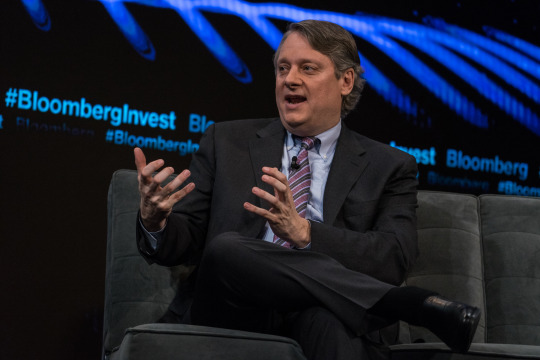
PIMCO Group Chief Investment Officer Daniel J. Ivacyn talked with Bloomberg’s Betty Liu at the Bloomberg Invest New York Summit, June 7, 2017.
“It’s usually the risk you don’t tend to think about which causes the issues,” said PIMCO Global Chief Investment Officer Daniel J. Ivascyn. He sees plenty of potential risks to markets today, from geopolitical developments to threats to economic growth that could come from high debt levels, unfavorable demographics, technology and more. Since these risks are present at a time of mostly positive economic news, he added, risk could accelerate if that changes.
In that context, preparation matters. Current valuations leave little margin for error, Ivascyn said, adding: “It’s a market where you’re going to be particularly susceptible to bad news.” He noted that PIMCO focuses on human capital: hard work and team effort. “There’s so much uncertainty on a global basis that there’s a benefit to having a lot of resources,” he said.
Key takeaway: “A good rule of thumb is that what caused the last crisis won’t cause the next one,” Ivascyn said.
More: Watch the full interview
Nasdaq’s Adena Friedman is building technology for the future
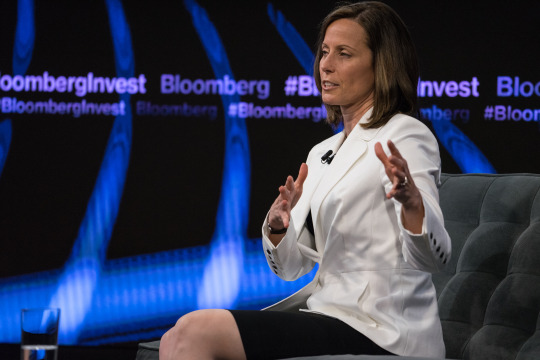
Bloomberg Markets Editor Joel Weber interviewed Nasdaq President and CEO Adena Friedman on the main stage at the Bloomberg Invest New York Summit.
Nasdaq president and CEO Adena Friedman detailed the advanced technology she and her team are building to help investors handle compliance and make data-driven decisions amid increasingly sophisticated trading activity and market interactions on the buy-side. Natural language processing, a new analytics hub and a data science lab to bring more intelligence into an alerting system are all part of the mix, she said.
“We’ve built out a new data platform, completely in the cloud – we’ve put all our data into it across markets,” she said. Then that data is compared with third party data sources, both outside and Nasdaq-owned, using machine intelligence to find signals to future trading behavior. For each data set, “we normalize them, we back-test them against our own data, we make sure they’re clean and you can grab them in any different form you want,” Friedman said – investors can incorporate it as either source data or an analytic within their own strategies.
Top stat: Up to 100 data sets are set to roll out over the next few years, she added, putting Nasdaq on the forefront of the future of financial technology.
More: Watch the interview
Investor Paul Singer advocates creative intent
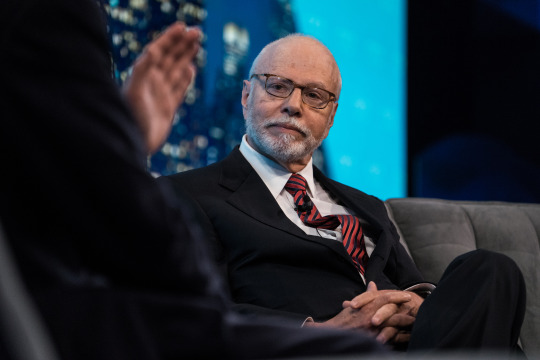
A special live taping of “The David Rubenstein Show: Peer to Peer Conversations” at the Bloomberg Invest New York Summit featured Elliott Management Corporation Founder and President Paul Singer.
Financier and philanthropist David Rubenstein sat down with Paul Singer, whose Elliott Management hedge fund manages about $34 billion, for a revealing interview that was also a live-taped episode of Rubenstein’s eponymous show. Singer, a well-known activist investor, explained that his approach entails positive engagement: “My style, and our style as a team is doing the work as thoroughly as we can,” he said, noting that the firm explores and tests their investment ideas before opening a dialogue with a target company.
He applies the same thinking to philanthropy: “trying to get involved, trying to make a difference, make an impact – to create things, not just write out a check.” Singer related how he began funding gay rights groups nearly two decades ago – which led to working with social activists in legacy gay groups whose politics were diametrically opposed to his own. “The culmination of that was a partnership with the Governor of New York to make gay marriage legal in NY,” he said, a project which required the help of Republican state legislators. “I found it energizing to build bridges,” he said, describing his focus on finding common ground.
More: Watch the interview.
Pension fund leaders seek hedge fund change
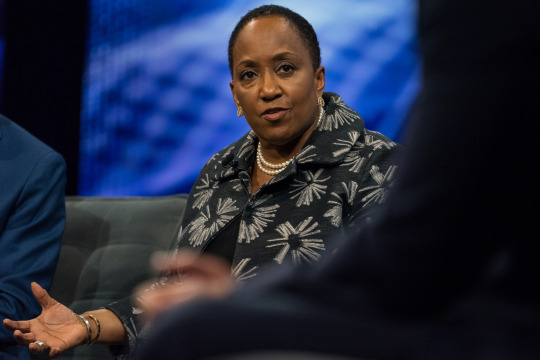
Vicki Fuller, Chief Investment Officer, New York State Common Retirement Fund shared insights on a panel that also included Jason Karp, Founder and Chief Investment Officer, Tourbillon Capital Partners, and Marc Levine, Chairman, Illinois State Board of Investment, at the Bloomberg Invest New York Summit. Photograph: Misha Friedman/Bloomberg
Hedge fund fees came under question in a session that included Vicki Fuller, the chief investment officer of the New York State Common Retirement Fund – which had $186 billion in assets as of December 2016 – and Marc Levine, chairman of the Illinois State Board of Investment.
Both investment chiefs said that the traditional model of 2 percent annual management fees and a 20 percent performance fee needed to be re-examined. While they had differing benchmarks for true alpha – investment returns that are hard to come by in today’s market – both were willing to give up liquidity and consider other strategies that would keep hedge funds in the investment mix.
So what’s the optimal structure? “We’re very intrigued with the 1-and-30 type strategy,” Fuller said, adding that “we’re starting the discussions. It’s going to be a small subset of managers. But we’re intrigued by that.”
More: Watch the panel discussion
Blackstone CEO Schwarzman explains why curiosity matters
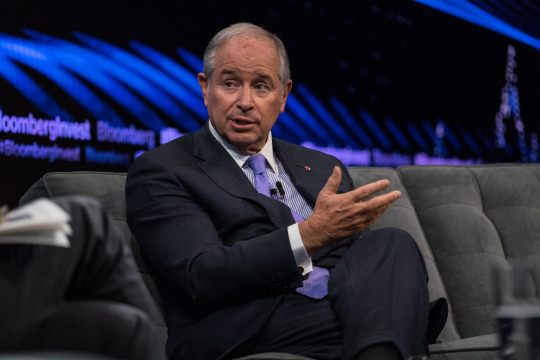
Blackstone Chairman, CEO and Co-founder Stephen A. Schwarzman on stage at the Bloomberg Invest New York Summit, June 7, 2017.
Bloomberg New York Bureau Chief Jason Kelly sat down with Blackstone Chairman, CEO and Co-founder Stephen A. Schwarzman in the last session of the Summit, exploring how to work productively in a world where change has become a constant.
“I’m a great believer that there’s no patents in finance,” Schwarzman said, adding: “You have to be continually innovative.” His company is set up to facilitate assimilating new developments – and acting quickly, he said: through regular meetings that foster exchange of information about what’s going on globally, “we find new opportunities. And when you see one, you don’t wait – you just go in and do it.”
That creates new products, raises new capital – and protects against risk by building diversity. “Your relevant set is the world,” he said. “You can be in every part of the capital structure, for different durations,” and that offers more opportunities to manage risk and create return for the people whose money is being managed.
More:
Watch the full interview
Read the Bloomberg Markets cover-story Q&A with Steve Schwarzman: “There are No Brave Old People in Finance”
– Jen Robinson | June 9, 2017